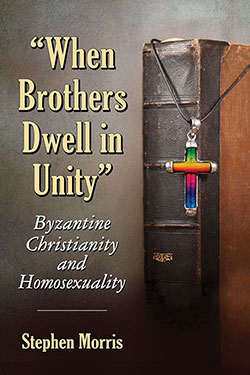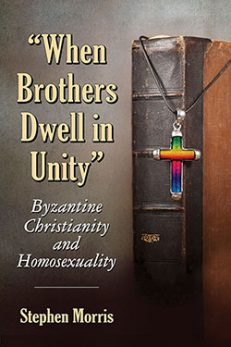“When Brothers Dwell in Unity”
Byzantine Christianity and Homosexuality
$29.95
In stock
About the Book
In the world of early Byzantine Christianity, monastic rules acknowledged but discouraged the homosexual impulses of adult males. What most disturbed monastic leaders was adolescent males being accepted as novices; adult men were considered unable to control their sexual desires for these “beautiful boys.” John Chrysostom, the Archbishop of Constantinople (397–407), virulently denounced homosexuality, but was virtually the only Byzantine cleric to do so.
Penances traditionally attached to heterosexual sins—including remarriage after divorce or widowhood—have always been much more severe than those for a variety of homosexual acts or relationships. Just as Byzantine churches have found ways to accommodate sequential marriages and other behavior once stridently condemned, this book argues, it is possible for Byzantine Christianity to make pastoral accommodations for gay relationships and same-sex marriage.
About the Author(s)
Bibliographic Details
Stephen Morris
Format: softcover (6 x 9)
Pages: 240
Bibliographic Info: appendices, notes, bibliography, index
Copyright Date: 2016
pISBN: 978-0-7864-9517-7
eISBN: 978-1-4766-2214-9
Imprint: McFarland
Table of Contents
Acknowledgments vii
Introduction 1
1. “Receive Not Any Boys, Beardless Youths, and Eunuchs”: Monastic Experience and the Beautiful Boys 17
2. The “Gay” Male as Byzantine Monster: Civil/Secular Legislation and Punishment for Same-Sex Behavior 42
3. “Better Than Free Fornication”: Suspicious Sexual Relationships in Canon Law and Penitential Handbooks 65
4. “Their Teaching Satanic … Their Life Also Diabolical”: John Chrysostom on Same-Sex Behavior 99
5. “Look Down from Heaven, Behold and Visit This Vine”: Liturgy and Anthropology of Adelphopoiia 137
Conclusions and Reflections 169
Appendix I. John Chrysostom’s Homily 4 on Romans 175
Appendix II. Service to Bless a Second/Third Marriage 182
Appendix III. Service for Adelphopoiia 186
Appendix IV. Goar’s Canonico-Historical Notes on Adelphopoiia 193
Chapter Notes 195
Bibliography 215
Index 225
Book Reviews & Awards
- “An exceptionally well-written, organized and presented theological treatise for both academic and non-specialist general readers with an interest in Christian theology, with respect to the LGBT community…very highly recommended”—Midwest Book Review;
- “The author is to be commended for a gripping, if chilling, read…sobering”—The Journal of Theological Studies
- “Brave and intelligent”—Journal of Ecclesiastical History
- “I found the book refreshing and courageous. It puts the status of homosexuality within the Byzantine tradition carefully in context. A sound piece of historical writing. Once I started reading, I couldn’t put it down. Morris engages the topic with objectivity, courage and grace. Fearless in dealing with sensitive subjects, its pastoral conclusions are insightful and helpful for discussion of the subject within all Christian churches, not just Orthodox Christianity.”—Wendy Mayer, Australian Catholic University
- “Advocacy, autobiography, and scholarship combine in this a fascinating study of homoeroticism in the Byzantine and Orthodox worlds. Morris also sheds welcome further light on the adelphopoiesis or “brother-making” same-sex unions in premodern Europe.”—Mathew Kuefler, author of The Manly Eunuch: Masculinity, Gender Ambiguity, and Christian Ideology in Late Antiquity
- “Original and significant…[Morris argues] that the Orthodox Church can recognize the adelphopoiesis rite known from Byzantine times as a recognition of same-sex civil marriage and supports [his] argument convincingly throughout the book by drawing on the parallel of ecclesiastical recognition for second and third marriages, with historical antecedents that reach back to the 9th century.”—Claudia Rapp, Professor of Byzantine Studies (University of Vienna), author of Brother-Making in Late Antiquity: Monks, Laymen and Christian Ritual





